Traffic Infractions and Violations in Virginia

What Counts As a Traffic Infraction on a Driving Record?
Generally, a traffic infraction is a non-criminal violation of Virginia’s traffic laws. Common examples include:
- Speeding,
- Failure to yield,
- Running a red light, and
- Improper lane changes.
These infractions are typically considered minor offenses but can still carry serious consequences. Points are added to your driving record for any moving violation, and accumulating too many points can result in license suspension. Importantly, traffic infractions are recorded on your driving record, not your criminal record, meaning they do not carry the consequences of a criminal offense. However, aggravating factors, such as reckless behavior or accidents causing injury, may lead to criminal charges.
Traffic infractions may appear on your driving record, which is reviewed by insurance companies and potential employers. Minor violations can, therefore, impact your insurance rates or job prospects, but they do not usually result in a criminal history.
Do Traffic Infractions Go on Your Record in Virginia?
Yes, traffic infractions are recorded on your Virginia driving record. The Virginia Department of Motor Vehicles (DMV) assigns demerit points to your record for each moving violation infraction. The number of points depends on the severity of the offense. For example:
- Speeding 1-9 mph over the limit: 3 points,
- Improper passing: 4 points, and
- Reckless driving or speeding 20+ over the limit: 6 points.
While points only affect your driving record for two years, the convictions remain visible for a specific duration, which varies depending on the violation. For instance, minor violations disappear in three years, while more severe offenses like reckless driving remain for 11 years. Infractions that escalate to criminal charges, such as reckless driving or DUI, will also appear on your criminal record.
How Long Do Traffic Infractions Stay on Your Record?
The length of time a traffic infraction remains on your record in Virginia depends on the violation. Here’s a breakdown:
- Minor infractions—typically stay for 3 to 5 years;
- Serious violations—such as reckless driving, remain for 11 years; and
- Serious commercial motor vehicle violations—are permanent on your record.
While demerit points associated with a violation expire after two years, the offense itself could remain visible longer, particularly for insurance evaluations. If a traffic infraction escalates to a misdemeanor or felony, it will appear on your criminal record permanently in most cases.
When Do Traffic Infractions Appear on a Criminal Record?
Most traffic infractions do not result in a criminal record. However, certain situations can elevate a traffic infraction to a criminal charge, including:
- Reckless driving. In Virginia, reckless driving is a misdemeanor and appears on both your driving and criminal records. Offenses like excessive speeding or aggressive driving can lead to this charge.
- Driving Under the Influence (DUI). DUI is always a criminal offense and has implications for both your driving and criminal record.
- Hit and run. Leaving the scene of an accident is considered a criminal act and carries severe penalties, including a permanent criminal record.
These charges differ from standard infractions because they can result in jail time, significant fines, and long-term consequences for your criminal history.
Difference Between a Traffic Infraction and a Misdemeanor
Understanding the difference between a traffic infraction and a misdemeanor is critical. Infractions are non-criminal offenses, while misdemeanors are criminal charges that carry severe penalties. Here are the key differences:
- Traffic infraction. A violation of traffic law, like speeding, resulting in a fine, demerit points, and possible driving restrictions. These infractions do not appear on a criminal record unless elevated due to aggravating circumstances.
- Misdemeanor. A violation of criminal law that can result in jail time, higher fines, and a permanent criminal record. Examples include DUI or reckless driving.
While infractions might seem less significant, they can still accumulate into larger problems. Multiple infractions can lead to license suspension or increased insurance premiums. Misdemeanors, on the other hand, carry long-term consequences that go beyond driving privileges, including losing certain rights or liberties.
Mitigating the Impact of Traffic Infractions
If you’re facing a traffic infraction, there are steps you can take to reduce its impact:
- Attend driving school. Completing a driver improvement clinic can offset demerit points and may satisfy certain court requirements.
- Challenge the infraction. You have the right to contest a traffic ticket in court. With the help of an experienced traffic lawyer, you may be able to reduce or dismiss the charge.
- Monitor your record. Regularly checking your driving record ensures accuracy and helps you stay aware of your standing with the DMV.
Proactively addressing traffic infractions can protect your driving privileges and minimize long-term consequences. While most infractions do not affect your criminal record, avoiding escalation to criminal charges is essential for safeguarding your future.
Why Choose Flusche & Fitzgerald?
At Flusche & Fitzgerald, we specialize in traffic-related cases, including infractions and misdemeanors. Our focused approach means we thoroughly understand Virginia’s traffic laws and how to navigate local courts. Whether you’re dealing with a minor infraction or a more serious charge, we work to achieve the best possible outcome with minimal stress.
We understand the frustration of dealing with tickets and points on your record. That’s why we offer personalized representation tailored to your situation. From challenging inaccurate charges to helping you understand your options, we’re here to guide you every step of the way.
Contact us today for a consultation, and let us help you protect your driving record and future.




